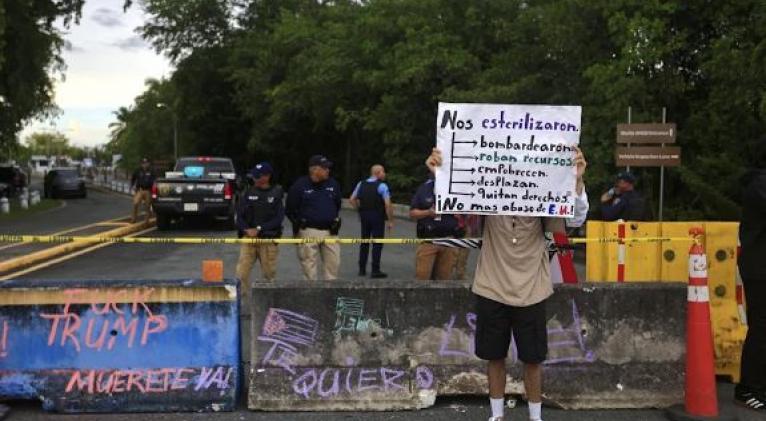Puerto Ricans Mobilize Again Against U.S. Navy Amid Caribbean Tensions
especiales

Puerto Ricans are once again rising up against the increased U.S. military presence on the island, fueled by tensions in the Caribbean with Venezuela and fears that the Navy may once more contaminate their beaches with weapons waste and reactivate former bases.
“It brings anxiety, nerves, unease, knowing full well how our community has been directly affected by the militarization of the archipelago. I would not want to think of history repeating itself,” said Ilandra Guadalupe Maldonado, born in Vieques, Puerto Rico, which holds the political status of a U.S. Commonwealth.
The U.S. Navy used parts of the islands of Vieques and Culebra, located in the eastern portion of the archipelago, as live-fire ranges. It also rented those areas to foreign nations to test weapons. To this day, the cleanup of unexploded ordnance remains incomplete.
“Six decades of militarization left us with contaminated land, contaminated people, fractured education, culture, identity—the list is long,” stressed Maldonado, 27, a member of the Vieques Women’s Alliance, an organization nominated for the Nobel Peace Prize in 2005 that sued the U.S. for human rights violations linked to its military exercises.
The young activist from the so-called Isla Nena—a territory with the highest cancer prevalence in Puerto Rico—recalled that her relatives speak with joy about the 2003 popular demonstrations that ultimately forced the U.S. military out of Vieques.
Now, she fights to preserve those hard-won gains, though the biggest obstacle, she argues, is the local government led by Governor Jenniffer González.
Government Support for U.S. Military
In welcoming U.S. Secretary of Defense Pete Hegseth this week, Governor González declared that the Puerto Rican government “is committed to this fight against drug trafficking” and described Venezuelan President Nicolás Maduro as “the cartel leader in Venezuela.”
“This is just beginning—the repositioning of military force on the island to fight drug trafficking throughout the Caribbean jurisdiction,” she emphasized during a press conference.
Current U.S. military maneuvers include amphibious landings and flight operations on the island, which is also preparing to receive ten F-35 fighter jets.
The governor’s ambition to make Puerto Rico the central hub for U.S. military operations and logistics in the Caribbean is not shared by the opposition or by many citizens.
The organization Mothers Against the War gathered hundreds of people for a protest last Sunday to reject this remilitarization and has called for another demonstration this coming Saturday.
Remembering to Avoid Repeating History
“We denounce the presence of military bases in Puerto Rico and also that Puerto Rico be used to invade Latin American countries. The Navy that invaded Vieques and Culebra is the same one carrying out these military exercises,” said Sonia Santiago, spokesperson for Mothers Against the War and the mother of an Iraq War veteran.
Meanwhile, Puerto Rican Independence Party (PIP) Senator Adrián González described the governor’s warm reception of Hegseth as “an attitude of complete submission, of complete surrender, of do whatever you want.”
González noted that Puerto Rico was militarized from the U.S. invasion in 1898 until 2003, and when the Navy finally left Vieques and closed its bases, “it was not voluntarily.”
“That was a peaceful civic struggle waged by the Puerto Rican people through civil disobedience movements where not a drop of blood was shed,” he told EFE.
The U.S. once maintained eleven military bases in Puerto Rico. Today, the National Guard continues to operate Buchanan, Fort Allen, Muñiz Air Base, and Camp Santiago, as well as parts of the former Ramey and Roosevelt Roads bases.
Many Puerto Ricans reject any return to militarization or complicity in potential invasions of other nations. As Senator González put it: “The military practices to kill, and we do not want our backyards to become that.”














Add new comment